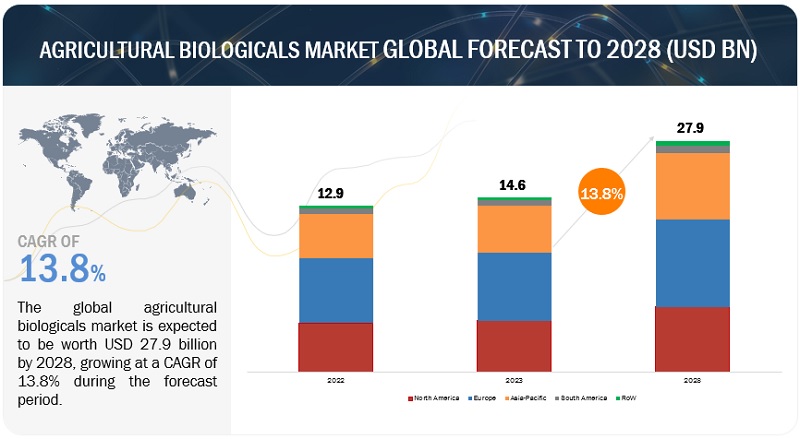
The agricultural biologicals market encompasses the production, distribution, and utilization of biological products in farming practices. These products, derived from natural substances and microorganisms, aim to enhance crop productivity, protect plants from pests and diseases, and improve soil health. According to a MarketsandMarkets research report, the agricultural biologicals market is projected to reach USD 27.9 billion by 2028, growing from USD 14.6 billion in 2023, with a CAGR of 13.8% during the forecast period.
Download PDF brochure: https://www.marketsandmarkets.com/pdfdownloadNew.asp?id=100393324
The market includes various agricultural biological products:
Biopesticides: These eco-friendly alternatives to conventional chemical pesticides are derived from living organisms like bacteria, fungi, or plant extracts. Biopesticides target pests and diseases while minimizing harm to non-target organisms and the environment.
Biofertilizers: These natural microorganisms promote plant growth and nutrient uptake. They enrich soil with beneficial bacteria, fungi, or microorganisms that fix nitrogen, solubilize phosphorus, and enhance nutrient availability.
Biostimulants: Enhancing plant vigor, stress tolerance, and crop yield, biostimulants improve plant metabolism when applied to plants or soil. They do not directly provide nutrition but enhance natural processes.
Biological Seed Treatments: These agents protect seeds from diseases and support early seedling growth and establishment.
The Agricultural Biologicals Market holds immense importance for agriculture, the environment, and sustainable food production due to several reasons:
Environmentally Friendly Farming: By promoting sustainable and less harmful farming practices, agricultural biologicals offer eco-friendly alternatives to synthetic pesticides and fertilizers, minimizing negative impacts on ecosystems and water quality.
Reduced Chemical Residues: The use of agricultural biologicals leads to safer food products with reduced chemical residues, addressing consumer concerns about pesticide residues in the food chain.
Enhanced Crop Health and Yield: Agricultural biologicals improve crop health, nutrient uptake, and yields by protecting plants from pests and diseases and promoting growth.
Integrated Pest Management (IPM): Integrated pest management strategies incorporate agricultural biologicals, reducing the reliance on chemical pesticides and managing pest populations sustainably.
Soil Health Improvement: Biological products contribute to soil health by increasing microbial activity, nutrient availability, and organic matter content, leading to better soil fertility and water retention.
View detailed Table of Content here – https://www.marketsandmarkets.com/Market-Reports/agricultural-biological-market-100393324.html
The South American region is expected to boost market growth during the forecast period. With vast agricultural lands, there is increasing awareness of the environmental impact of conventional practices. To address these concerns, there is a growing demand for agricultural biologicals, which provide sustainable alternatives and comply with stringent regulations in international markets, where South American countries are significant agricultural commodity exporters.
Key players in the agricultural biologicals market include BASF SE (Germany), Syngenta AG (Switzerland), Bayer AG (Germany), UPL (India), and Corteva Agriscience (US). These companies are expanding their presence through agreements, partnerships, acquisitions, and collaborations, strengthening their manufacturing facilities and distribution networks across North America, Asia Pacific, and Europe.
